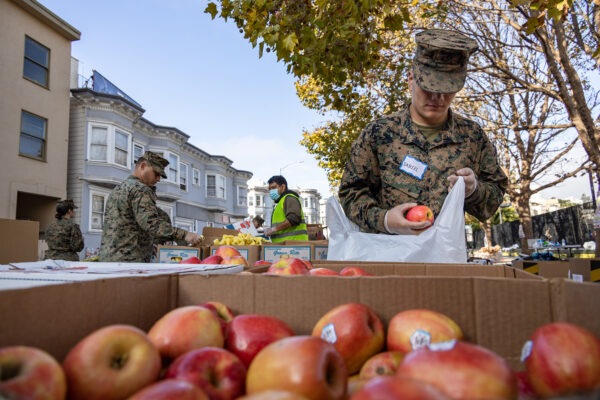
U.S. Marines and Sailors prepare bags of food for a food bank during San Francisco Fleet Week 2022 (Photo: U.S. Marine Corps Sgt. Aldo Sessarego)
A recently published research report conducted by Rand Corp. has unveiled more evidence for a concerning issue affecting our nation’s Veterans: food insecurity.
This problem is alarming because it reveals that almost 70% of Veterans aged 70 and older who are struggling to secure enough food are not utilizing government food assistance programs. The research points to a critical need for the federal government to rethink its approach to identifying Veterans facing food insecurity and to reevaluate disability payments to encourage more Veterans to seek assistance.
Food insecurity, as this study emphasizes, can set off a chain of problems, including physical and mental health issues, and an elevated risk of suicide.
The data from Rand’s research suggests that 1.4 million Veterans in the United States are dealing with food insecurity. Less than 5% of these Veterans are enrolled in the federal government’s Supplemental Nutrition Assistance Program, or SNAP, formerly known as food stamps.
To address this issue, the study recommends screening methods for Veterans to assess their food access and to conduct further research to understand the barriers preventing them from enrolling in assistance programs. These hurdles could include stigma surrounding accepting help, a lack of awareness about the program, or policies that count Veterans’ disability benefits as income. While the study did find that Veterans receiving disability payments are less likely to enroll in SNAP, more research is needed to understand if these payments are making Veterans ineligible for assistance even when they struggle to afford enough food.
The VA conducts routine screenings for food insecurity during primary care visits. It’s important to note that Veterans who don’t qualify for or use VA health care may not be included in these screenings.
While this study focuses on Veterans, a parallel issue has been identified among active-duty Service Members. Approximately, 15% of Service Members experience food insecurity, and housing allowances can push their incomes above the eligibility threshold for government assistance.
Responding to growing concerns, the White House initiated a national strategy on hunger, nutrition, and health, urging the VA to review its food-assistance programs and screening procedures.
The results of this study emphasize immediate action to address food insecurity among our Veterans. By addressing the barriers preventing Veterans from accessing food assistance programs and conducting further research into the underlying causes of food insecurity, steps can be taken to improve Veterans’ well-being.